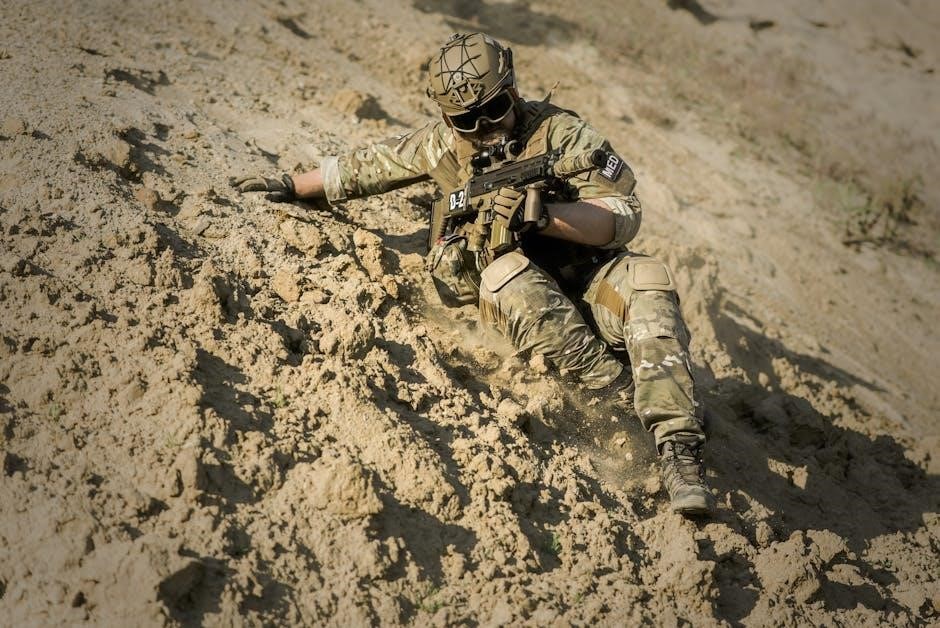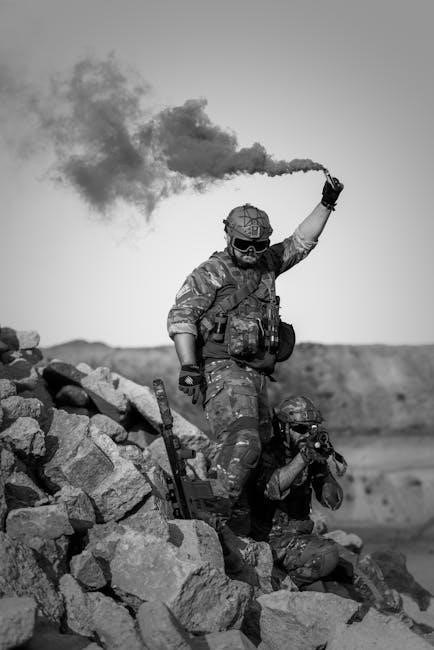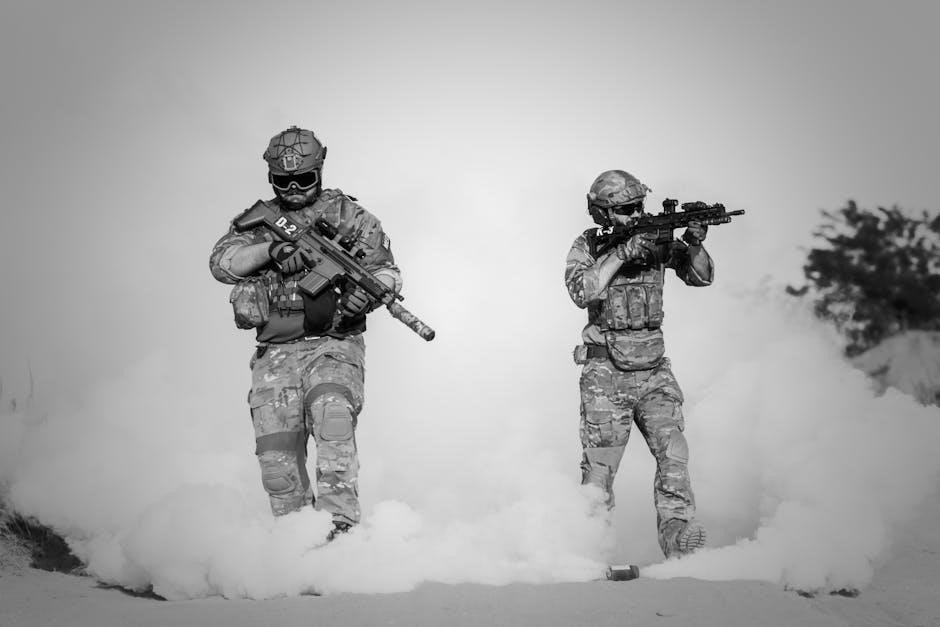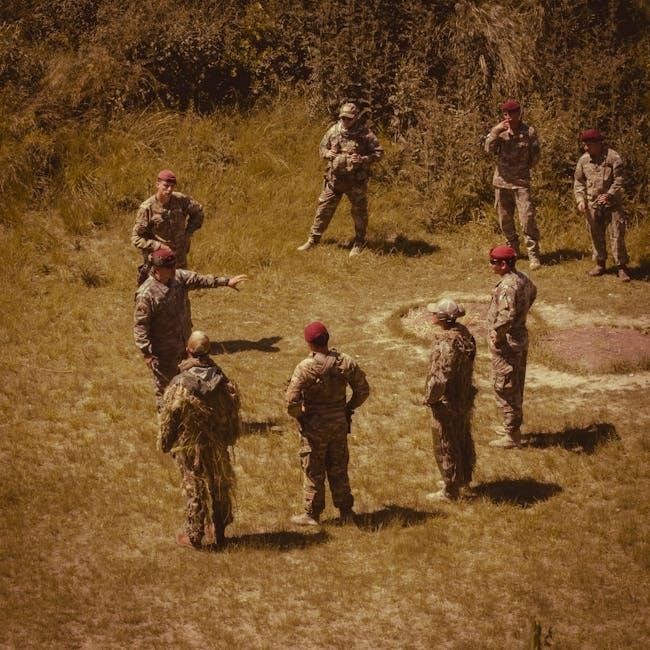The Army NCO Creed is a guiding statement for non-commissioned officers, emphasizing leadership, professionalism, accountability, and commitment to soldiers and the Army, shaping military culture and values.
Background and Significance of the NCO Creed
The NCO Creed was developed in the 1970s to establish a shared identity and standard of excellence for non-commissioned officers. It reflects the Army’s commitment to leadership, professionalism, and accountability, serving as a cornerstone of military culture. The Creed emphasizes the NCO’s role as a leader, mentor, and steward of Army values, ensuring continuity and cohesion across generations. It is not just a statement but a living philosophy that guides NCOs in their daily duties, shaping their identity and the Army’s collective mission.

History of the NCO Creed
The NCO Creed was created in 1973 by a group of non-commissioned officers at Fort Benning, Georgia, to define their role and standards, providing a foundation for leadership and professionalism.
Development of the Creed in the 1970s
The NCO Creed was developed in 1973 by a group of non-commissioned officers at Fort Benning, Georgia. This period marked a significant shift in the Army’s focus on enhancing NCO professionalism. The creed was created to establish a clear standard of conduct and leadership for NCOs, who had previously lacked a formal oath like officers. It emphasized accountability, professionalism, and dedication to soldiers, serving as a foundational document to guide NCOs in their roles. The creed’s creation reflected the Army’s commitment to strengthening its leadership core during a transformative era. Today, it remains a cornerstone of NCO identity and responsibility, widely accessible in PDF formats for reference and training.

Evolution of the NCO Creed Over Time
The NCO Creed has undergone refinement since its inception in the 1970s, adapting to the evolving needs of the Army. Initially developed to establish a standard for NCO professionalism, it has been updated to reflect modern military values and challenges. Today, it remains a foundational document, widely accessible in PDF formats, guiding NCOs in leadership and accountability. The creed’s enduring relevance ensures it continues to inspire and shape the identity of non-commissioned officers across generations.

Key Principles of the NCO Creed
The NCO Creed emphasizes professionalism, leadership, accountability, and unwavering commitment to soldiers and the Army, upholding its values and traditions as the backbone of the force.
Professionalism and Leadership
The NCO Creed underscores the importance of professionalism and leadership, emphasizing that no one is more professional than the NCO. As leaders, NCOs are expected to set the standard, guide soldiers, and embody the Army’s values. The Creed highlights the NCO’s role as a mentor and a figure of integrity, ensuring that leadership is both effective and ethical. By upholding professionalism, NCOs foster a culture of excellence, inspiring soldiers to strive for their best and maintaining the trust of their teams and the institution;
Accountability and Responsibility
Accountability and responsibility are central tenets of the NCO Creed, emphasizing that NCOs must uphold the highest standards of duty and ethics. They are accountable for their actions and decisions, ensuring the integrity of their leadership. By leading by example, NCOs foster a culture of responsibility within their units, inspiring soldiers to embrace accountability. This commitment ensures trust and discipline, vital to the Army’s mission and the advancement of its values.
Commitment to Soldiers and the Army
Commitment to soldiers and the Army is a cornerstone of the NCO Creed, reflecting a deep dedication to the welfare and growth of subordinates and the organization. NCOs prioritize the development and well-being of their soldiers, ensuring they are prepared to meet the Army’s mission demands. This commitment extends to upholding Army values and fostering unit cohesion. By dedicating themselves to their soldiers’ success, NCOs embody the Creed’s promise to lead, mentor, and serve with unwavering loyalty, strengthening the Army’s foundation and legacy.

The Role of NCOs in the Army
NCOs are the backbone of the Army, serving as leaders, mentors, and role models. They are responsible for training, guiding, and inspiring soldiers to achieve mission success.

Leadership and Mentorship
Leadership and mentorship are central to the role of NCOs, who lead by example and foster a culture of professionalism and accountability. They guide soldiers in developing skills, making sound decisions, and adhering to Army values. NCOs take a hands-on approach to mentorship, ensuring soldiers grow personally and professionally. This commitment to leadership not only strengthens individual soldiers but also enhances unit cohesion and mission readiness, reflecting the principles outlined in the NCO Creed.
Role in Maintaining Army Values and Traditions
NCOs are entrusted with upholding and preserving Army values and traditions, serving as role models who embody the principles of respect, integrity, and selfless service. They ensure adherence to the Army’s core values, fostering a culture of professionalism and discipline. By leading by example, NCOs reinforce time-honored traditions, maintaining unit identity and cohesion. Their commitment to these values strengthens the Army’s legacy and mission, ensuring continuity and excellence across generations of soldiers.
Impact of the NCO Creed on Army Culture
The NCO Creed fosters professionalism, leadership, and accountability, shaping a culture of excellence. It influences daily operations, decision-making, and the collective identity of soldiers, promoting unity and discipline.
Influence on Daily Operations and Decision-Making
Influence on Daily Operations and Decision-Making
The NCO Creed significantly impacts daily operations by guiding leaders to uphold professionalism, accountability, and commitment. It fosters a culture of responsibility, influencing decisions at all levels. Soldiers are reminded to lead by example, prioritize mission success, and maintain high ethical standards. The Creed’s principles ensure consistency in leadership, promoting unity and discipline. By embedding these values, NCOs shape a cohesive and effective force, enabling the Army to achieve its objectives with integrity and excellence.
Role in Shaping the Identity of NCOs
The NCO Creed plays a pivotal role in shaping the identity of non-commissioned officers, defining their purpose and responsibilities. It emphasizes professionalism, leadership, and accountability, fostering a sense of pride and unity among NCOs. By embodying the Creed, NCOs affirm their commitment to the Army’s values and traditions, reinforcing their role as the backbone of the organization. This shared philosophy strengthens their identity, ensuring they lead by example and uphold the highest standards, both personally and professionally, while inspiring future generations of leaders.

How to Live by the NCO Creed

Living the NCO Creed requires leading by example, mentoring soldiers, and upholding Army values and standards in daily actions and decisions consistently.
Practical Application in Daily Life
Living the NCO Creed involves demonstrating leadership, accountability, and professionalism in daily interactions. NCOs should consistently lead by example, fostering a culture of trust and excellence. Mentorship and training soldiers to meet Army standards are crucial. Ethical decision-making and upholding Army values in every action ensure credibility. By prioritizing mission success and soldier welfare, NCOs embody the Creed’s principles, creating a positive impact on unit cohesion and operational effectiveness. Daily adherence to these standards reinforces the Creed’s relevance and strengthens military culture.
Importance of Personal and Professional Development
Personal and professional growth are vital for NCOs to uphold the Creed’s standards. Continuous learning, self-improvement, and staying updated on military tactics and leadership skills ensure effectiveness. NCOs must pursue higher education and certifications to enhance their expertise. Professional development fosters adaptability and resilience, enabling NCOs to lead diverse teams and tackle complex challenges. By prioritizing growth, NCOs set an example for soldiers, reinforcing the Army’s commitment to excellence and maintaining the Creed’s principles in their daily roles.
The Army NCO Creed remains a cornerstone of military leadership, guiding NCOs in upholding professionalism, responsibility, and excellence. Its enduring relevance ensures continued inspiration for future leaders.
The Enduring Relevance of the NCO Creed
The NCO Creed remains a vital foundation for non-commissioned officers, embodying timeless principles of leadership, professionalism, and responsibility. Its relevance endures as it continues to inspire NCOs to uphold Army values and traditions. By fostering a culture of accountability and excellence, the Creed ensures NCOs remain the backbone of the Army. Its adaptability to modern challenges solidifies its importance, guiding NCOs in shaping the future of military leadership while honoring their heritage.
